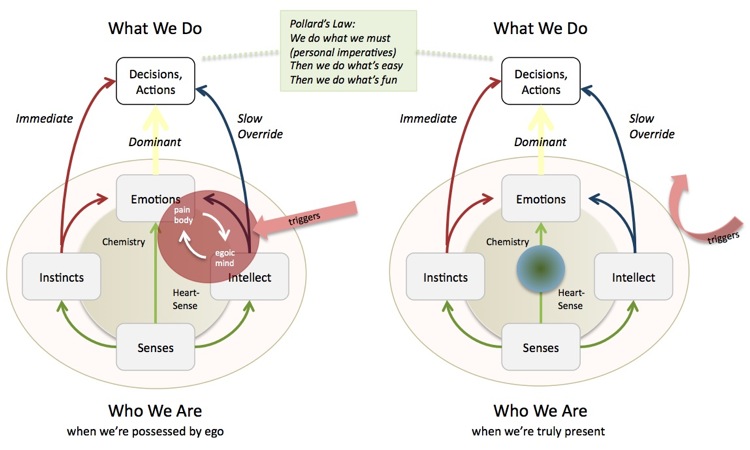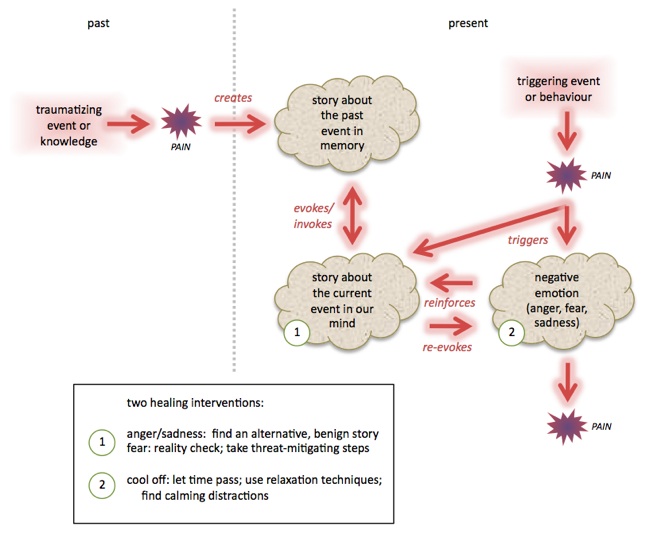
I spent today outside, among the trees, silent, naked, just paying attention. It’s part of my rather clumsy presencing practice. This is what occurred to me during this meditation-inquiry-contemplation session.
There has been a conversation going on inside me almost my whole life. But at some point in childhood, around age 7, I became unable to hear it. The conversation was among four ‘factions’ that make up the complicity of me: the intuiters, the sensers, the feelers, and the thinkers.
None of these factions is located in any particular part of my body. Living creatures are more complex than that. In fact these factions aren’t really ‘things’ at all. In a real sense, we are made of processes, not components. What we perceive as living ‘stuff’ — tangible collections of atoms or cells or other components — are merely vestiges, images, imaginings, at a point in time. But time is just a concept, unreal (as any informed physicist will tell you), a made up convention, so “points in time” are similarly unreal. So this ‘stuff’ we imagine “we’re” made up of is just an abstraction, a convention, a model to make sense of this staggeringly complex world.
So these four factions that make up me are just processes, ways of knowing, ways of perceiving, ways of making sense.
What’s more, the convention of calling the collection of stuff and processes that are/happen within our bodies “us”, is just another unreal model, a simplification. Most of the cells within “our” bodies are genetically unrelated to “us”, though without them “we” would quickly perish. And most of the processes that affect us transcend in every sense the boundaries of our bodies: they are the processes that are making us “everybody-else” as EE Cummings put it, processes that are collective, associative, neither initiated nor controlled by us, yet very much part of the processes that make us “us”.
Unfortunately, our brains are not cognitively capable of appreciating this beyond an abstract level. We cannot ‘see’, except perhaps under the influence of ayahuasca, that we are not individual, not a ‘thing’ or set of ‘things’, not a ‘self’, not in any way separate from all-life-on-Earth. Our ‘being-alive’ may express itself through our bodies, but it is not our bodies, nor is it the part of us we abstractly call our ‘minds’ — those plodding, oversimplifying pattern-seeking organs invented to coordinate our bodies’ movements and sense-processing functions, that now imagine themselves to be ‘us’.
So, in this conversation, the thinkers and feelers and sensers and intuiters are talking among themselves, trying to make sense of all this, despite our brain’s interfering and increasingly dangerous oversimplifications. Trying to do their best, in good Darwinian style, to ensure that the actions of, and upon, our cells and organs are ‘healthy’ — good for ‘us’, us being the complicity of our components and processes and inseparably those of all other life on Earth.
So what happened to me at age 7 that this amazing conversation was lost to me, or at least to the parts of me that I came to recognize as ‘me’?
I think what happened first is that I became afraid to feel. Unlike how I was during my idyllic first few years of life, by age 7 feeling had become too risky, too unsafe, too painful. The joys and the pleasures just weren’t enough to compensate for the suffering that came when I allowed myself to really feel. Too often feeling meant falling victim to the terrible negative emotions of fear, anger and sadness that were triggered almost non-stop in my interactions with other people and our culture. I couldn’t bear all the suffering that came from witnessing the cruel reality of this hard, terrible, unfair world.
But we can’t, of course, just stop feeling, unless we’re one of those rare and unencumbered psychopaths who have mastered not-feeling.
So instead, what I think happened when I was 7 was that the thinking faction of me cut itself off from the feelers, pretended they were unessential, unimportant, weak. What I was feeling became ‘divorced’ from what I was thinking. This is because, as Eckart Tolle describes, our large brains can easy push us into a vicious cycle (the red circle in the chart above) of egoic mind (fictional stories that our culture has told us are true and ‘factual’) and pain-body (the negative emotions such as anger, fear, guilt, shame and grief that these stories invoke in us). This is shown in more detail in the chart below:

So, returning to the top chart again, it’s perfectly understandable that my thinker and feeler factions, at age 7, should try to divorce, to separate my thinking from my feeling, to short-circuit the vicious cycle. My thinkers didn’t want my distressing stories to trigger painful negative emotions, and my feelers didn’t want my negative feelings to recall and reinforce traumatic stories. So “I” stopped listening to their conversation.
My intuiters and sensers were quickly rendered incoherent by this disconnection. Sensers can’t make sense of what they’re sensing, and intuiters can’t integrate what they’re intuiting, without the holistic feedback of a conversation that integrates all four ways of knowing/being. So now when I see beauty (as I did today) I feel good, and I appreciate it aesthetically, but the feeling-good is thoughtless and the aesthetic appreciation is unfeeling. Likewise, my intuitions can’t be trusted as long as what I intuitively ‘feel’ can’t be rationalized, and what I think intuitively reasonable can’t get emotional confirmation. So my sensers and intuiters have become discouraged and disoriented, and, all thanks to those damned childhood fears, all-of-me has become, essentially, incoherent. Damaged. Disconnected.
Guess which ‘side’ my brain took in the ‘divorce’? The safe, ‘rational’, trying-to-be-unemotional side, the side of the thinkers. So I lived inside my head for much of my life. Avoiding my emotions (except for brief periods of fearlessness when I was madly in love). Ignoring my senses. Distrusting my emotions.
Note that our language sees these four factions as so integrated it overlaps the words used to describe them. Sense is a word that describes what both our thinkers (“making sense of” and “sensible”) and our sensers (the five “senses” and the word “sensual”) do. And feel is a word that describes what both our feelers (“how are you feeling”) and our sensers (“feel this”) do. And then there are the phrases “makes intuitive sense” and “gut feel”. When these factions of our knowing/being become incoherent, so must our use of these words.
As you probably know, I’m not a big fan of “self-improvement”, so I don’t have expectations of reconciling and healing this disconnect and re-becoming coherent. I’m still afraid to feel. “No use to the world broken”, I say.
But it seems to me that these four factions are still talking, still sending messages, still trying to communicate. That’s a part of their, and our, prime directive of being healthy, and my brain’s short-circuiting of the conversation doesn’t change that, though I imagine the unanswered messages are probably a little confused by now. Here is what I think they’re saying, that I’m not hearing, at least most of the time:
Intuiters and sensers:
Just begin. Go outside. Do stuff. Little, non-scary things. Moonlight walks. Scented candles. Path lights. Sound of the surf. Every day. Just be, as attentively as you can. No pressure. Breathe. Let yourself not think so relentlessly. Close your eyes, feel the sun, hear the birds, smell the rain. Listen to us, just a little bit. You know everything is wonderful, amazing, magical; forgive yourself for not feeling it, not yet. It will come back. It will come again. It’s OK to be discouraged. It’s OK to be afraid.
Now, open your eyes. Look, and keep looking. If you get tired, rest and then try again. You remember what it’s like to really see. You can still do that. You’re not that damaged.
Thinkers:
Ask yourself why other people’s happiness is more important to you than your own, why the only way that you can be really happy yourself is when you’ve made someone you care about happy. And you call yourself a misanthrope! And try this, you’re smart: Imagine coherence. Imagine what it’s like to be really present, what you would be doing, how you’d be feeling and acting. And imagine (since you probably can’t remember) who you really were, and imagine you are that again, imagine and picture what it’s like to be a process not a thing, to be a complicity not an individual, to be an inseparable part of all-life-on-Earth, not apart.
During a previous presencing exercise you wrote this, and several people wrote and said you were really on to something. Awesome writing, man! Writing on all four cylinders. Think about it. Use it next time you are trying to become more present:
How do I imagine, in my moments of inquiry and contemplation, my normal state of living if I were able to awaken, connect, and realize who/what I (and the unity of which I am inextricably a part) really am, every moment?
I imagine myself in a state that is at once very relaxed and very aware. A state where my intellect is largely at rest (and damn, it needs a rest!) and where my emotions are calm, even, compassionate, and playful — not “under control” but just at peace. A state where my senses and instinct come to the fore, with my senses acute, noticing, connected, taking in, feeling-at-one-with, enjoying, and my instincts are ‘directing’ ‘me’, gently, letting go, letting things come, just being present, being generous, ‘touching’ appropriately when that ‘touch’ would be helpful.
No longer my ‘self’.
I imagine myself being just a part, flying, floating. Green and blue and white, flowing and glowing.
Softening. Getting lighter.
Vanishing.
Feelers:
When you’re dead you won’t feel anything. You’ll be safe, then, you’ll be free, free from the bondage of your fears. But in the meantime, you’re running out of time to really feel, fearlessly. Yes, you could fall in love again, but that euphoria, that ecstasy, is transient. Too easy. How much do you still have to lose by listening to your feelings? How much do you have to gain? You remember, don’t you, what it feels like to really feel. To really be alive. That’s the story to remember, to recall, to tell yourself and tell others. Why not take a chance, a calculated risk? No hurry, whenever you’re ready. But you know you’re nearly ready, don’t you? Your impatience could set you free.





Thanks for this, it helps to find the path again. I think this is also talking about attachment (possessiveness and addictiveness) on another level. The issue of “attachment” appears to be almost completely off the radar in the public discourse that I frequent, and could be tackled in terms of true “power-within” I think (refer to powercube.net – note: not the faked up version of power-within). Cheers thanks, take care, to stay in touch.
Dave, this really resonates with me. Thanks for doing the hard work and sharing your journey so freely. I too spent many, many years mostly thinking, not feeling, and denying my intuition. Good suggestions and questions for easing toward being more present and whole.
I really like this post. Thanks for sharing your process of reknitting your fragmented selves. I’m honored to be a witness.